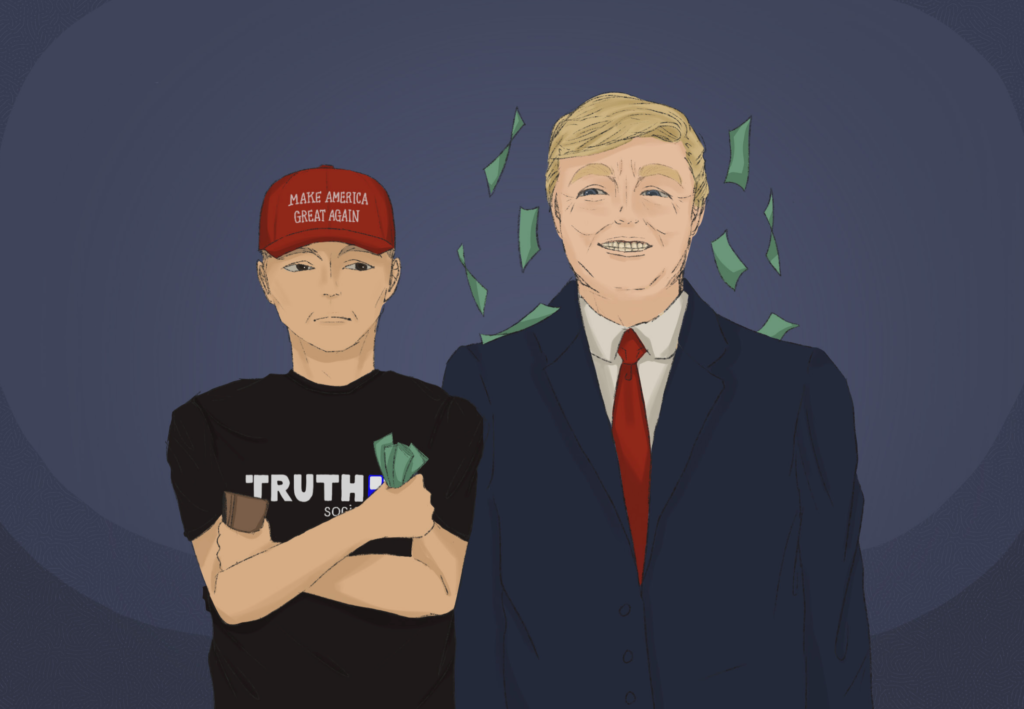
Graphic by Leah Han ’27/The Choate News
By Jai Midha ’27
In the ever-changing social media landscape, we often question the validity of online information. Truth Social, a social media platform helmed by Former President Donald Trump P’00, marks a pivotal milestone in the ongoing debate of free speech and media biases. However, the site may prove to be more of a threat to productive speech than a facilitator of it.
In February 2022, Trump launched Truth Social after being banned from most social media platforms following his involvement in the January 6 Capitol attack. The primary purpose of Truth Social is to offer an alternative platform that promises less censorship for its users, especially those who feel that mainstream media platforms are biased against conservative voices. Trump also wanted a platform to communicate directly with his supporters without the risk of being banned.
Perhaps most importantly, Trump’s supporters see Truth Social as a direct counter to what they would call “fake news,” as it allows for free speech that can’t be taken off the Internet. In modern social media, the term “fake news” is often thrown around, but what does it really mean, and how have politicians and people in power used it to their advantage?
“Fake news” is erroneous information deliberately presented as factual news; it often intends to damage or ruin a person’s or entity’s reputation. An example of “fake news” benefiting one institution by ruining the reputation of another would be Company A spreading harmful rumors about Company B, leading to a sales drop for Company B and subsequently raising Company A’s sales. Whether that be Facebook’s 2017 stock plunge after Former President Barack Obama commented on the influx of “fake news” on the social media platform or AI deepfakes of U.S. Rep. Rob Wittman, vice chairman of the U.S. House Armed Services Committee, calling for military support towards Taiwan, it’s clear that “fake news” is undoubtedly impactful, especially in a world dependent on online media.
The concept of“fake news” is directly applicable to the world of politics. When power and influence are at stake, many politicians ignore their moral compasses and spread false information to help their own party and harm others. Truth Social is directly tied into this debate over “fake news.” As I’ve previously established, Truth Social offers a platform for uncensored media, meaning there is no filter for posts or information. According to XYZ, nearly two percent of Americans get their news from Truth Social. This means a decent percentage of the voting population is informed by sources without credibility or validity.
Moreover, it’s perfectly possible that Trump had an ulterior motive in creating Truth Social. We’ve previously seen Trump use social media to spread rumors and gain support, whether that be the false statements about his administration’s accomplishments made during his farewell address at Joint Base Andrews in Maryland or the persistent denial of Russian collusion in spite of more than 140 contacts with Russian nationals having been revealed. Trump’s pattern of lies in conjunction with a free-for-all social media platform run by Trump’s team would make it easy for him to spread “fake news” or propaganda.
On a platform where censorship, or the lack thereof, is flaunted, humans will inevitably spread hate speech and discriminatory narratives. We must all be wary of how we use our words, as they are our most powerful tool and the foundation of all communication. Hate speech uses words to belittle and diminish others and is the root of bigotry and prejudice
Truth Social shows the struggle between the desire for free speech and the need to prevent the spread of false, harmful information. It points out the difficulty of finding a balance in today’s polarized world. This platform also serves as a reminder of social media’s impact on politics, our moral compasses, and how we communicate with one another.




